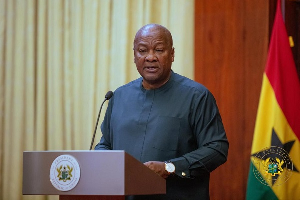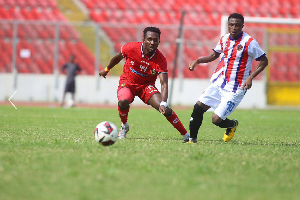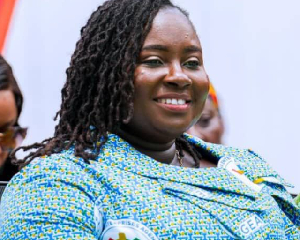It’s refreshing to read that many proposals have been made by Ghanaians into the review of the 1992 Constitution (Ghanaweb 28 May 2010). I would like to make the following submission for consideration by the Constitution Review Commission (CRC).
First and foremost the outcome of the review must result in a new constitution that will make all Ghanaians equal before the law. Any new or revised Constitution must not perpetuate the current arrangement where some people, after committing heinous crimes against their fellow citizens, are throwing their weight about, with impunity, because they are indemnified from prosecution. Again any new constitution to come out from the review must give real meaning to our national motto “Freedom and Justice”. We cannot profess to be people who subscribe to the letter and spirit of our national motto of “Freedom and Justice” when citizens who have been wronged especially during the AFRC and PNDC era cannot seek justice because of a constitutional limitation of their rights. Secondly, sovereignty of the nation resides in the people of Ghana and this sovereignty is exercised on their behalf by their representatives who are elected to Parliament. The parliament in Ghana therefore must be able to make or unmake laws in the exercise of its powers. To put it into a constitution (as was done in the 1992 Constitution) that Parliament shall have no power to amend a certain section of the constitution is tantamount to saying sovereignty of the nation lies somewhere in the atmospheric void – not with the people’s representatives. In the 1992 Constitution, we allowed selfishness, fear by a minority (or perhaps criminals) of retribution and an evil desire to perpetuate injustice to cloud our national conscience. We cowardly said yes to a sinister clause that had the effect of curtailing Parliament’s power to amend the Constitution. The new constitution to come out from the review must restore Parliament’s sovereign power and dignity.
Thirdly I would like to propose a more effective decentralization of powers to District Assemblies or Councils in a new constitutional dispensation. The country as it stands now is too centralised and as a result, the greater hinterland where all resources abound is dying. Hitherto vibrant towns and villages we used to know are now ghost towns. Social life in many of them has virtually died. Infrastructure – houses, schools buildings, town halls, palaces, places of convenience, churches, etc are all in serious state of derelict. The reason is simple - everything that happens in the country happens in Accra. A new school leaver has to travel to Accra if he/she hopes to get a job. Villagers from all over the country trooping to Accra to make a living do not mind the environmental conditions they are confronted with. They are willing to live in places most often not fit for animals - filthy and dangerous compared to the homes in the villages they left behind - as long as they can sell dog chains or plantain chips or packets of biscuit to motorist in a busy street in Accra. The Ghanaian residing abroad must, as a rule, build a house in Accra regardless of where he comes from. Accra is thus all in all and no wonder it has become one big filthy, disorganized, lawless and a choking slum city.
There must be a conscious effort by means of constitutional provisions to decentralize political, economic and administrative functions in Ghana to Districts Administrations - to put life back into towns and villages. I am not advocating for the federal type of arrangement in Ghana, we cannot afford that but we can afford strong and effective District Administrations that can take on some of the administrative responsibilities of the central government and regenerate the hinterland. Regional Administrations and their Ministers as they stand now serve no purpose apart from being the ruling government’s propaganda tools. They must be abolished. The colossal financial resources they waste every year on partying, fun fare and political party functions - can be given to Districts Administrations who are at the coalface in rendering services that directly impact on people.
Some of the functions of government – health, primary and secondary education, agriculture, social welfare, rural and district roads, housing, environmental protection, economic development etc can easily be devolved to District Councils. This devolution may lead to the attraction of highly skilled workforce into the Districts, with the positive social and economic spinoffs. Each district may eventually become an economic growth point in the country where investment can be attracted. The potential for vibrant economic activity in the Districts may act as the right centripetal stimulus – to bring back the people who trooped to Accra in search of greener pastures. A constitutional provision must allow for a percentage of the resources generated in each District to be given to the District for development. For example, annually, apart from the income that the central government may give to, say the Obuasi District Council, a constitutionally determined percentage of the gold revenue from the mines should be given to the Council for development. The emphasis on devolution of powers to District Administrations in the country will, in the long run, solve many problems such as chieftaincy disputes and the agitation for new regions. The present geographic regional structure may be retained as they will assist in determining the borders of District Administrations.
Lastly, I propose a constitutional provision that will make District Chief Executives (DCEs) and Councillors (Assemblymen) to be elected in elections not appointed. The present system whereby the President appoints DCEs is, to say the least, nonsensical. It is recipe for maladministration and corruption. Competent professional men and women are what the people District Administrations need, not stooges or bootlickers of the ruling President. The electorate in each District must be able to choose who they want as their chief executive (Mayor) and councillors to be - in competitive elections. The hopelessness we see in almost all the Districts Councils and Metros in Ghana is the result of square pegs being put into round holes by the President. The current Constitutional Review presents Ghana an opportunity to give itself a people-centred and a development-oriented constitution founded on the rule of law and freedom and justice.
P K BOATENG ((The writer is both a chartered management accountant and a chartered secretary and is a consultant on Corporate Strategy and Public Finance Management. E-mail address – pkboateng@gmail.com).
Opinions of Saturday, 5 June 2010
Columnist: Boateng, P. K.


















